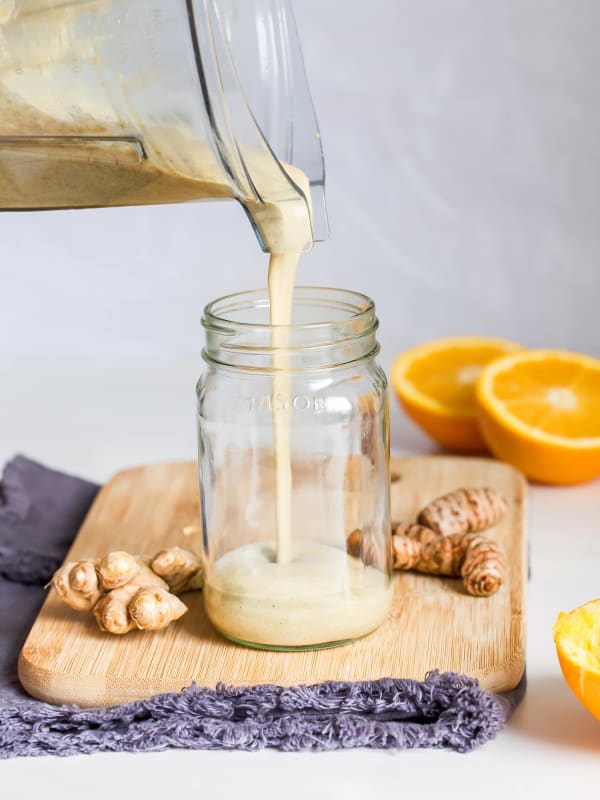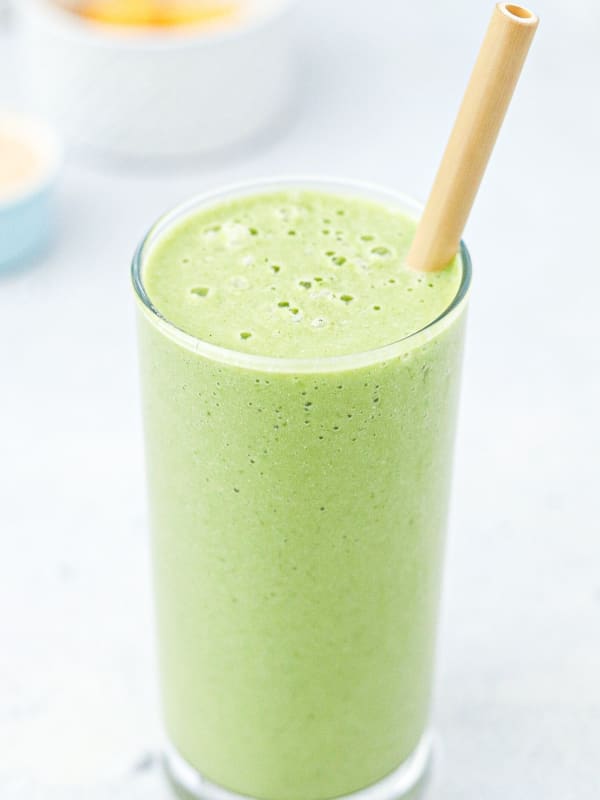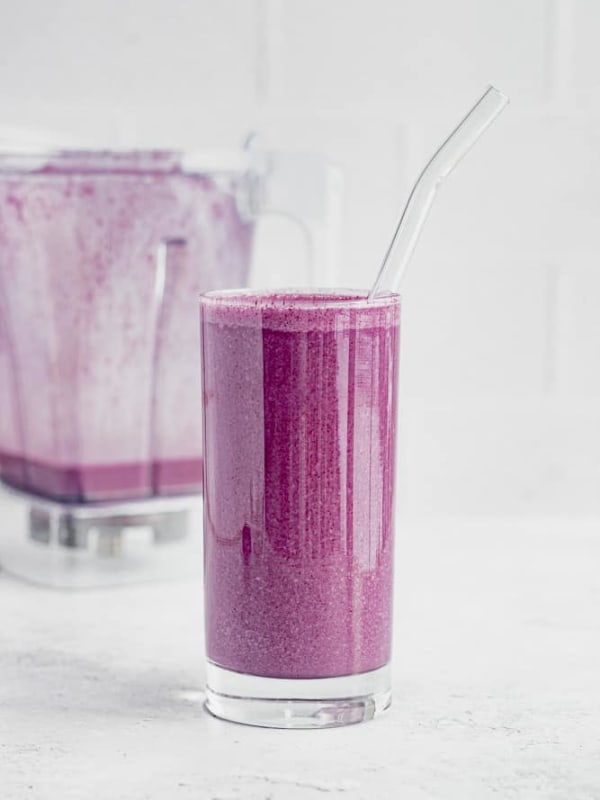Popular Conditions & Diets

The term "nutritionism"- first coined by sociologist Gyorgy Scrinis and later brought into the mainstream by author Michael Pollan- describes a prevailing belief in today's society. This overarching paradigm essentially holds that the value of food is reducible to its nutrients rather than being understood as a holistic, complex entity.
Meal replacement drinks represent the logical endpoint of the nutritionism mindset: food is replaced, altogether, by an assembly of isolated nutritional components. But, as we will explore, this reductionist approach overlooks the profound intricacies of whole foods in shortsighted and problematic ways.
Historically, liquid meals have been used in clinical settings and hospitals under medical supervision for weight loss and around surgery. In somewhat different incarnations, they've also been employed by athletes needing something extra for peak performance.

More recently, meal replacement drinks have skyrocketed in popularity among the general public as a quick, easy, and presumably nutritious solution. With lofty promises of weight loss, convenience, and energy boosts, it's no wonder they're filling store shelves and permeating wellness culture. The global market for meal replacement drinks is expected to hit $7 billion by 2032.
But before you eschew chewing for a pre-packaged shake, it's worth taking a closer look at what's really in the bottle. The unfortunate truth is that many mainstream meal replacement drinks are far from being the clean, healthy option they're marketed to be. When scrutinized through a nutrition lens, they can actually do more harm than good. Let's take a look at six major issues with them:

Most meal replacement drinks are loaded with synthetic vitamins and minerals produced from unseemly origins, like petroleum and coal tar. While these are intended to mimic the nutrient profile of whole foods, the reality is that synthetic nutrients aren't absorbed or used by the body as efficiently. The cheap, isolated compounds might look good on a nutrition label but simply do not provide the full spectrum of benefits you'd get from natural sources.
On top of that, many shakes contain artificial colours, flavours, vegetable oils, fillers and preservatives- ingredients added for texture, taste, and shelf life, but not for your health. Think of antimicrobials like potassium sorbate and calcium propionate, thickeners like xanthan and guar gum, and stabilizing emulsifiers like carrageenan. Many of these components are cheap to manufacture and good for profitability, but they can also potentially cause digestive upset and long-term health issues in susceptible individuals.

Many commercial meal replacement brands pack their bottles with sugars or artificial sweeteners to make these drinks palatable and mask the taste of fillers and vitamins. Corn syrup- among the most commonly used meal replacement sweeteners- comes from one of North America's most abundant and federally subsidized crops, so it's incredibly cost-effective for manufacturers. But what's best for a company's bottom line is not necessarily ideal for human physiology. High sugar levels can lead to spikes in insulin, increased fat storage, and energy crashes. Meanwhile, artificial sweeteners like sucralose or aspartame have been linked to negative impacts on microbiome diversity, inflammation, and anxiety.
In some ways, the reliance on processed sugar is also an issue of real estate: while complex carbohydrates from sweet potatoes and whole grains can provide fibre, vitamins, minerals, and quick-burning cellular energy, they take up a significant amount of space on the dinner plate. Refined sugar, by contrast, provides a concentrated dose of calories and fuel without adding unwanted bulk to the product. Artificial sweeteners are non-caloric, meaning they may help with weight loss efforts at the expense of satiety and fullness. Either way, the resulting streamlined cocktail can offer a type of quick fix in a pinch… but whether or not it can truly replace food is another story.

One of the most common nutritional shortcomings in commercial meal replacements is the need for more dietary fibre and whole-food nutrients. Fibre is crucial for digestion, satiety, blood sugar regulation, and a healthy microbiome- yet it's often stripped away in favour of a smooth consistency. Adding insoluble fibre- the type that doesn't dissolve- can make a drink grainy. Soluble fibre isn't much better, creating a gel-like solution that excessively thickens the drink. In both cases, fibre can cause separation and settling as a bottled drink sits for weeks or months (or years!)
Moreover, whole foods provide individual vitamins and minerals and a vast array of phytonutrients, enzymes, and antioxidants that work synergistically to promote optimal health. Meal replacements often miss this critical point, focusing on primary macronutrients for satiety and energy (protein, fats, carbs) rather than vitamins and minerals- let alone the full, nuanced spectrum of what actual food offers.

Protein is often touted as the star of meal replacements, but not all protein is created equal. Many drinks use cheap, low-quality protein sources, like soy protein isolate, which, while a complete protein, contains lower levels of essential amino acids like leucine. Processed soy protein can lead to lower rates of muscle repair than animal-based proteins.
Soy protein is heavily processed, often subjected to solvents like hexane and very high temperatures, which can oxidize and denature the proteins. This denaturation changes the shape and function of the protein and makes its amino acids less nutritionally effective.
Additionally, if not properly balanced, many plant-based protein options are incomplete, lacking the full range of essential amino acids necessary for optimal health. These low-grade proteins can lead to gas and bloating, as well as reduced efficacy in muscle repair and satiety- especially compared to higher-quality sources like whey. Many of these cheaper ingredients are used to lower costs, but they can come at the expense of your health and performance.

To determine the quality of a meal replacement drink you're considering, looking at the ingredients on the label is a great place to start. But unfortunately, there may be ingredients that don't get listed anywhere on the packaging, such as toxic heavy metals like lead, arsenic, and mercury, and other contaminants like bisphenol A (BPA).
This is much less rare than you might think; multiple consumer watchdog agencies have found this to be a widespread problem affecting many major brands of protein supplements and meal replacements. Plant-based protein sources like soy and hemp, in particular, were consistently found to contain twice as much lead.
The issue of contaminants also highlights a problem regarding frequence of use; if we drink a slightly imperfect nutrition shake once, the world won't stop turning. But the more, and the longer, we rely on a nutritional substitute burdened with neurotoxins and carcinogens, the more likely we are to run into health complications down the line.

A meal replacement drink might supply calories, vitamins and minerals. However, whole foods offer much, much more. Everyday foods we might take for granted, like spinach, garlic, and potatoes, each feature over 200 different chemical compounds!
We might think of oranges as rich in vitamin C (and they are), but let's not forget that they also contain quercetin, rutin, and a host of bioflavonoids, antioxidants, phenols, fibre and many more hard-to-pronounce elements that work with the vitamin C to promote health. The chemical complexity of nature is unmatched by a vitamin C tablet or any other substitute.
Scientific research is still parsing out exactly what these compounds all do, and how they work together synergistically. But what we do know is that homo sapiens have been eating real food since the dawn of our species. Meal replacement products, by comparison, occupy a minuscule sliver of the evolutionary calendar.
Nothing replaces food, and a synthetic substitute for it can only ever be just that. Amidst the busyness of modern life, convenience is no small selling point… but the reliance on these drinks can lead to a palpable disconnection from real, nourishing meals.
However, there is a role for meal replacement drinks to play, and in certain situations they can provide much needed nutritional support. In supervised settings, they have even shown significant benefits for post-surgical recovery, weight loss, and diabetes management.
But surely, we can do better than industrial fillers and genetically modified corn and soy byproducts. If we, or our loved ones, need to rely on liquid nutrition for a time, isn't there a way to provide them with something better than we find in mass-produced, shelf-stable astronaut drinks? The longer someone needs to rely on a replacement for solid food, the more we might want to ask, and answer, this question.
5 potential side effects of meal replacement shakes. Reviewology. (2024, August 14). https://reviewology.com/health/side-effects-of-meal-replacement-shakes/
Aguayo-Guerrero, J. A., Méndez-García, L. A., Solleiro-Villavicencio, H., Viurcos-Sanabria, R., & Escobedo, G. (2024). Sucralose: From Sweet Success to Metabolic Controversies-Unraveling the Global Health Implications of a Pervasive Non-Caloric Artificial Sweetener. Life (Basel, Switzerland), 14(3), 323. https://doi.org/10.3390/life14030323
Astbury, N. M., Piernas, C., Hartmann-Boyce, J., Lapworth, S., Aveyard, P., & Jebb, S. A. (2019). A systematic review and meta-analysis of the effectiveness of meal replacements for weight loss. Obesity reviews : an official journal of the International Association for the Study of Obesity, 20(4), 569–587. https://doi.org/10.1111/obr.12816
Chodon, T. (2022). Are meal replacement shakes safe? here’s what nutritionists want you to know - times of India. The Times of India. https://timesofindia.indiatimes.com/life-style/health-fitness/weight-loss/are-meal-replacement-shakes-safe-heres-what-nutritionists-want-you-to-know/articleshow/93948235.cms
Davis, L. M., Coleman, C., Kiel, J., Rampolla, J., Hutchisen, T., Ford, L., Andersen, W. S., & Hanlon-Mitola, A. (2010). Efficacy of a meal replacement diet plan compared to a food-based diet plan after a period of weight loss and weight maintenance: a randomized controlled trial. Nutrition journal, 9, 11. https://doi.org/10.1186/1475-2891-9-11
Devor, S. T. (n.d.). Whole food choices versus liquid meal replacements. https://www.copcp.com/Media/cf1723d8-4d07-469b-ac26-1e297de32cac.pdf
Ditschuneit H. H. (2006). Do meal replacement drinks have a role in diabetes management?. Nestle Nutrition workshop series. Clinical & performance programme, 11, 171–181. https://doi.org/10.1159/000094450
Franchak, J. (2022, November 3). Meal replacement shakes: The good, the bad and the ugly. Jennifer Franchak Functional Nutrition & Wellness. https://www.jenniferfranchak.com/thoughts-meal-replacement-shakes/
Gornall, L. (2022, June 29). Are meal replacement shakes healthy?. LiveScience. https://www.livescience.com/are-meal-replacement-shakes-healthy
Guo, X., Xu, Y., He, H., Cai, H., Zhang, J., Li, Y., Yan, X., Zhang, M., Zhang, N., Maddela, R. L., Nicodemus-Johnson, J., & Ma, G. (2018). Effects of a Meal Replacement on Body Composition and Metabolic Parameters among Subjects with Overweight or Obesity. Journal of obesity, 2018, 2837367. https://doi.org/10.1155/2018/2837367
Hirsch, J. (2018, February 28). Arsenic, lead found in popular protein supplements. Consumer Reports. https://www.consumerreports.org/dietary-supplements/heavy-metals-in-protein-supplements/?srsltid=AfmBOopoAMXZSb-yONpFfKrkNGgBRttkUtLQoAD32R0_LDhW8aqSFsQj
Ho, C., Samwil, S. N. M., Kahairudin, Z., Jamhuri, N., & Abd Aziz, A. (2023). Exercise and pre-habilitation with high whey-protein-based meal replacement therapy promote weight loss and preserve muscle mass before bariatric surgery. Asian journal of surgery, 46(9), 3716–3721. https://doi.org/10.1016/j.asjsur.2023.03.026
López-Gómez, J. J., Ramos-Bachiller, B., Primo-Martín, D., Calleja-Fernández, A., Izaola-Jauregui, O., Jiménez-Sahagún, R., González-Gutiérrez, J., López Andrés, E., Pinto-Fuentes, P., Pacheco-Sánchez, D., & De Luis-Román, D. A. (2023). Effect on Body Composition of a Meal-Replacement Progression Diet in Patients 1 Month after Bariatric Surgery. Nutrients, 16(1), 106. https://doi.org/10.3390/nu16010106
Martens, M. J., & Westerterp-Plantenga, M. S. (2012). Mode of consumption plays a role in alleviating hunger and thirst. Obesity (Silver Spring, Md.), 20(3), 517–524. https://doi.org/10.1038/oby.2011.345
Min, J., Kim, S. Y., Shin, I. S., Park, Y. B., & Lim, Y. W. (2021). The Effect of Meal Replacement on Weight Loss According to Calorie-Restriction Type and Proportion of Energy Intake: A Systematic Review and Meta-Analysis of Randomized Controlled Trials. Journal of the Academy of Nutrition and Dietetics, 121(8), 1551–1564.e3. https://doi.org/10.1016/j.jand.2021.05.001
Oliveira, C. L. P., Boulé, N. G., Berg, A., Sharma, A. M., Elliott, S. A., Siervo, M., Ghosh, S., & Prado, C. M. (2021). Consumption of a High-Protein Meal Replacement Leads to Higher Fat Oxidation, Suppression of Hunger, and Improved Metabolic Profile After an Exercise Session. Nutrients, 13(1), 155. https://doi.org/10.3390/nu13010155
Peng, Y., Kyriakopoulou, K., Ndiaye, M., Bianeis, M., Keppler, J. K., & van der Goot, A. J. (2021). Characteristics of Soy Protein Prepared Using an Aqueous Ethanol Washing Process. Foods (Basel, Switzerland), 10(9), 2222. https://doi.org/10.3390/foods10092222
Sheridan, M. (n.d.). The problem with meal replacement shakes (Liquid Protein). Mike Sheridan. https://coachmikeblogs.com/the-problem-with-meal-replacement-shakes-liquid-protein/ Smith, M. (2023, December 6). What happens if you only drink meal replacement shakes?. Rootana. https://www.rootana.com/articles/what-happens-if-you-only-drink-meal-replacement-shakes/?srsltid=AfmBOopU0YIgmAk7mZ66JkIKevRY1Ao2_cyZ1INu51Myy193pEf3XDEg
Sooriyaarachchi, P., Jayawardena, R., Pavey, T., & King, N. A. (2024). A low-calorie meal replacement improves body composition and metabolic parameters in shift workers with overweight and obesity: a randomized, controlled, parallel group trial. Nutrition & metabolism, 21(1), 32. https://doi.org/10.1186/s12986-024-00799-8
Supplemental nutrition drinks: Help or hype?. Harvard Health. (2020, August 31). https://www.health.harvard.edu/staying-healthy/supplemental-nutrition-drinks-help-or-hype
Thiel R. J. (2000). Natural vitamins may be superior to synthetic ones. Medical hypotheses, 55(6), 461–469. https://doi.org/10.1054/mehy.2000.1090
Tieken, S. M., Leidy, H. J., Stull, A. J., Mattes, R. D., Schuster, R. A., & Campbell, W. W. (2007). Effects of solid versus liquid meal-replacement products of similar energy content on hunger, satiety, and appetite-regulating hormones in older adults. Hormone and metabolic research = Hormon- und Stoffwechselforschung = Hormones et metabolisme, 39(5), 389–394. https://doi.org/10.1055/s-2007-976545
Understanding the denaturation of soy protein: Temperature effects and consequences. Atlas Bar. (n.d.). https://atlasbars.com/blogs/soy-explained/understanding-the-denaturation-of-soy-protein-temperature-effects-and-consequences van Vliet, S., Burd, N. A., & van Loon, L. J. (2015). The skeletal muscle anabolic response to plant- versus animal-based protein consumption. The Journal of Nutrition, 145(9), 1981–1991. https://doi.org/10.3945/jn.114.204305
Westervelt, A. (2015, August 18). Heavy metals prove all too common in meal replacement products, says watchdog group. The Guardian. https://www.theguardian.com/sustainable-business/2015/aug/18/soylent-fda-heavy-metals-silicon-valley-as-you-sow
What are the side effects of meal replacement shakes?. drink wholesome - easy to digest protein powders for sensitive stomachs. (n.d.). https://www.drinkwholesome.com/the-side-effects-of-meal-replacement-shakes/?srsltid=AfmBOoocmjS6ABFnRFtnREJi1n1SiYKWGiwZgPjDjVoRQvXJ1QuW6IvJ
Wholier, L. (2023a, April 29). Why does protein powder make me gassy?. wholier. https://www.livewholier.com/blogs/your-health/why-do-vegan-protein-powders-make-you-bloated?srsltid=AfmBOoqVSVwYyqAIYKjpEkBG9FYx3aKR27yZ51Z5e3okZP5lsYI1JLxM#show
Wholier, L. (2023b, April 29). Why does protein powder make me gassy?. wholier. https://www.livewholier.com/blogs/your-health/why-do-vegan-protein-powders-make-you-bloated?srsltid=AfmBOoqVSVwYyqAIYKjpEkBG9FYx3aKR27yZ51Z5e3okZP5lsYI1JLxM#show
Witek, K., Wydra, K., & Filip, M. (2022). A High-Sugar Diet Consumption, Metabolism and Health Impacts with a Focus on the Development of Substance Use Disorder: A Narrative Review. Nutrients, 14(14), 2940. https://doi.org/10.3390/nu14142940
Yahoo! (n.d.). Meal replacement shakes market to reach $7.0 billion, globally, by 2032 at 9.1% CAGR: Allied Market Research. Yahoo! Finance. https://finance.yahoo.com/news/meal-replacement-shakes-market-reach-141200806.html?guce_referrer=aHR0cHM6Ly93d3cuZ29vZ2xlLmNvbS8&guce_referrer_sig=AQAAAGAg-65fVDgyLgZL9pd6WOiOLdplXUWv0CRCUYwnWkwriQ_O56ByfzmMDTn46-fdXIxFQVeDzrV6oCqQAi2-l8PYtdevwtDKhRXzVPIkQF12SOb-b-ighvMfjggyhBTSi0MHe_4Emsqxxtu-bZaPREWvpFMYbbphcPAz-T1SWEJ1&guccounter=2
Ye, W., Xu, L., Ye, Y., Zeng, F., Lu, X., Li, Y., & Liu, L. (2023). Efficacy and Safety of Meal Replacement in Patients With Type 2 Diabetes. The Journal of clinical endocrinology and metabolism, 108(11), 3041–3049. https://doi.org/10.1210/clinem/dgad273
Photo by Aleksander Saks on Unsplash